Welcome to the September 1, 2023 issue of Cotton News, a service provided by Plains Cotton Growers Inc. for the cotton industry in the Texas High Plains and beyond.

Cruz and Boozman Tour Texas; Told to Return Profitability to Agriculture
“The world is totally different now than it was two years ago,” Sen. John Boozman (R-AR) said, addressing the group at a round table for him and Sen. Ted Cruz (R-TX) on Aug. 30, 2023. “We can no longer operate on prices that were set in 2012. It’s not just fertilizer and fuel that has gone up. It’s everything.”
Roughly 22 commodity and agriculture industry organizations were represented at the Sen. Ted Cruz and Sen. John Boozman Roundtable held at the National Ranching Heritage Center in Lubbock. As the event moderator, PCG CEO Kody Bessent began, “Policy is like football. It’s a team sport and we’re glad to have a diverse range of agricultural groups with us today.”
The Senators listened as industry representatives discussed challenges experienced in their segments. All have been hurt by production costs stemming from higher interest rates and record inflation.
Click on the tabs to see the cotton industry’s feedback to the Senators.
PCG President and Floyd County Producer Martin Stoerner
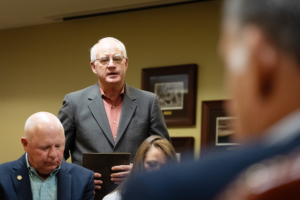
Photo credit: Chris Corrado, Sen. Cruz Photographer
“An increase in reference prices is needed to combat the cost of production,” said Martin Stoerner, Plains Cotton Growers president.
Producer and Texas Farm Bureau State Director District 2 Walt Hagood
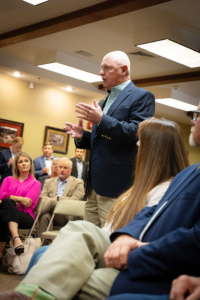
Photo credit: Chris Corrado, Sen. Cruz Photographer
“The 2022 Emergency Relief Program was approved by Congress last December and we still haven’t seen those payments. It’s becoming a real problem for producers and for the banks since farmers do not cash flow in these tough times,” said Walt Hagood, producer in Lynn, Lubbock and Hockley Counties and Texas Farm Bureau State Director for District 2.
Crosby County Producer, Southwest Council of Agribusiness Board Member Steve Verett

Photo credit: Chris Corrado, Sen. Cruz Photographer
“We need to raise the level of support — it’s not current to producer needs in 2023. In the meantime, this 2022 disaster assistance program needs to be implemented just like the ERP Phase 1 for 2020 and 2021. The reason we’re having to look at emergency-type programs is because our safety net is not adequate for the needs of today,” said Steve Verett, Crosby County producer and Southwest Council of Agribusiness board member.
Owner and CEO of Willingham Southwest Cotton Gin and Chair and CEO of South Plains Financial Inc. Curtis Griffith
“It’s tough for farmers to buy at retail prices yet sell their goods at wholesale prices — the cost/price squeeze really hurts them and us as their financial institutions,” said Curtis Griffith, owner and CEO of Willingham Southwest Cotton Gin and Chair and CEO of South Plains Financial Inc.
Crop Insurance Agent Gid Moore
“In regard to 2022 ERP, this is much needed by producers, and they would put it to good use if they could get it. It’s maddening that USDA hasn’t issued payments nine months after approval,” said Gid Moore of Moore Crop Insurance and Crop Insurance Professionals of America vice chair.
Rolling Plains Cotton Producers President Sutton Page
“I have a 5,000-acre farm and to some that seems big, but, in reality, I’m a small farmer that needs a great amount of capital to operate. It’s very disheartening to spend so much money on a crop just to see it run out of gas due to weather conditions. If there were extra money in the Farm Bill, the option to elect both STAX and ARC/PLC that would be a huge help for us,” said Sutton Page, Rolling Plains Cotton Growers president.
Farmers Cooperative Compress President and CEO Eric Wanjura
“I represent roughly 9,000 members who are either cotton growers or landowners throughout West Texas and beyond. These members rely on the Farm Bill, particularly the crop insurance provision — it’s crucial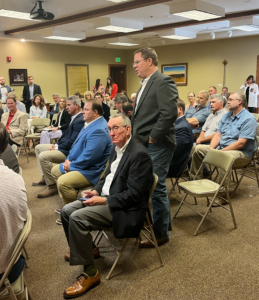 to their livelihood, and by extension, ours. Cotton is unique in that once the cotton is grown and harvested, it relies on a robust infrastructure to process the crop further — larger than that of grains. This cotton infrastructure depends on volume. These last several drought years where the volume has been down has hurt infrastructure, particularly the ginning industry, with no way to benefit from crop insurance as the producer does. If there is any meaningful way to include infrastructure in the Farm Bill, that would be helpful in supporting the cotton industry as a whole,” said Eric Wanjura, president and CEO of Farmers Cooperative Compress.
to their livelihood, and by extension, ours. Cotton is unique in that once the cotton is grown and harvested, it relies on a robust infrastructure to process the crop further — larger than that of grains. This cotton infrastructure depends on volume. These last several drought years where the volume has been down has hurt infrastructure, particularly the ginning industry, with no way to benefit from crop insurance as the producer does. If there is any meaningful way to include infrastructure in the Farm Bill, that would be helpful in supporting the cotton industry as a whole,” said Eric Wanjura, president and CEO of Farmers Cooperative Compress.
That afternoon, following the roundtable, Sen. Cruz visited the USDA-AMS Lubbock Cotton Classification Complex, the most advanced cotton classification facility in the world. Processing up to 50,000 samples per day, Lubbock supervisor Danny Martinez, showed Cruz the automated climate control laboratory and explained classing process and procedures.
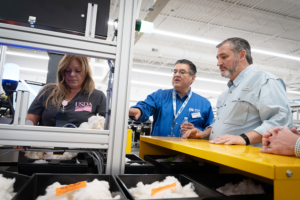
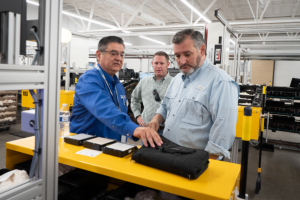
Photo credit: Chris Corrado, Sen. Cruz Photographer
Cruz and his team wrapped up the afternoon by traveling to Brandon Patschke’s farm to learn more about cotton farming operations.
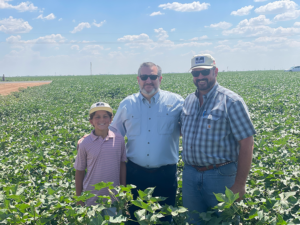
Photo credit: Blake Vineyard, Sen. Cruz staff
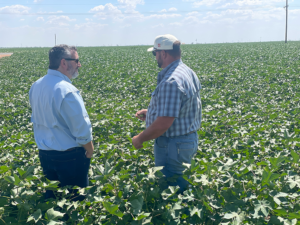
At the end of the day, Cruz said:
“Texas is an ag powerhouse nationally, but the role y’all play is at the heart of Texas and who we are. We all know this is a crazy time nationally. I think what’s happening in Washington right now is absolutely nuts. We’re seeing an extreme agenda being pushed in Washington. When I look at rural Texas, farmers and ranchers, y’all embody the common sense conservative values that make Texas Texas. You don’t have time to deal with a lot of BS other than actual BS. And I look at y’all and see that you are defending who we are as a state. You are defending the values that built Texas and that define you and I think that is incredibly important to making this state continue to be the incredible success story that we have been for so long. I have been proud for 11 years to keep fighting to keep Washington off of your backs to let you do what you do. You feed us you clothe us, you keep us alive and you keep our values alive.”